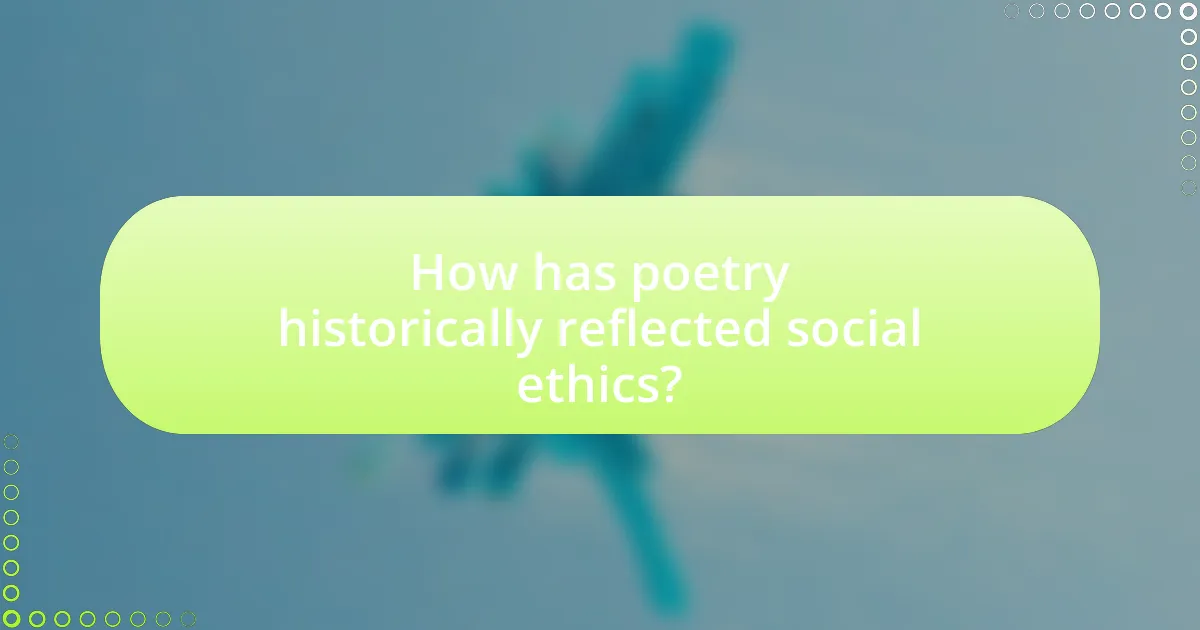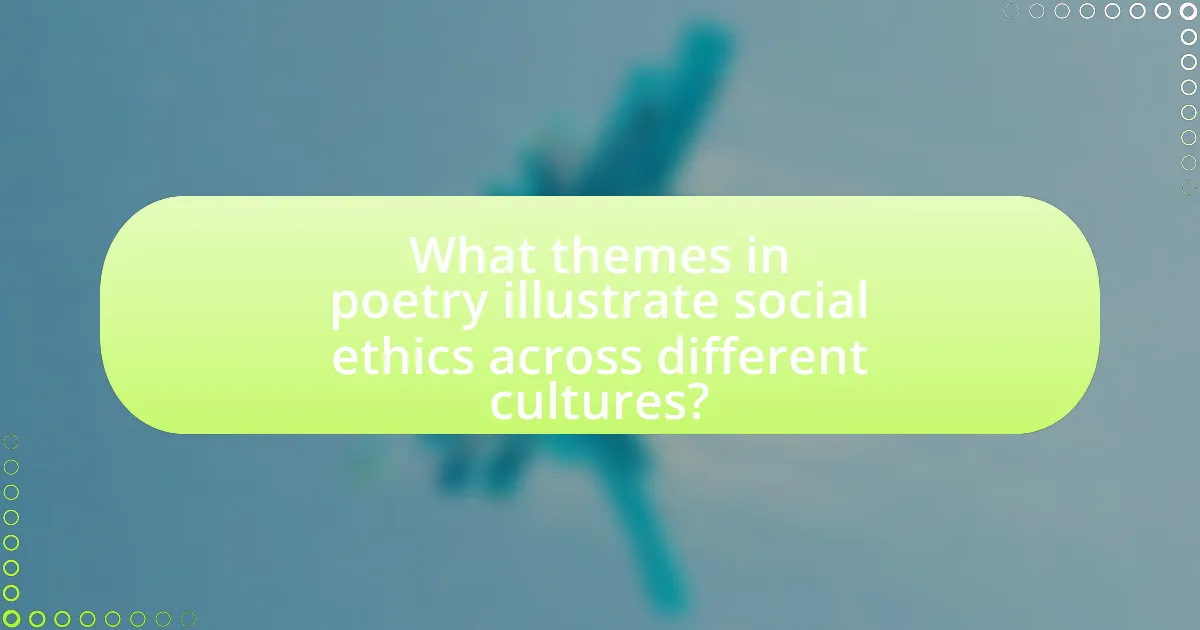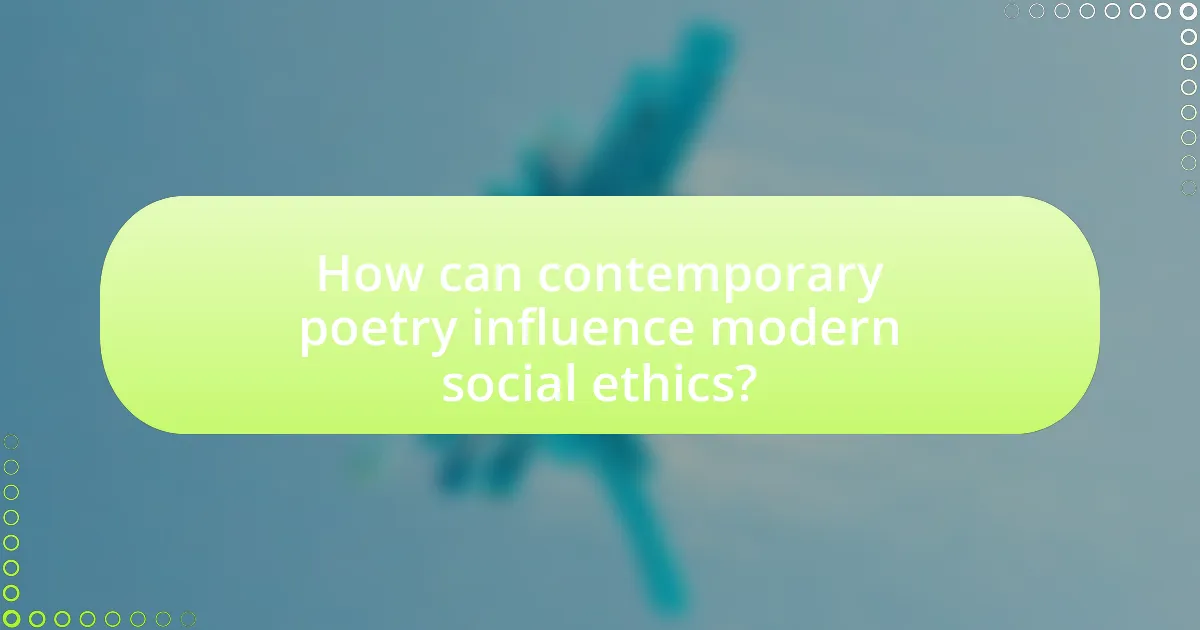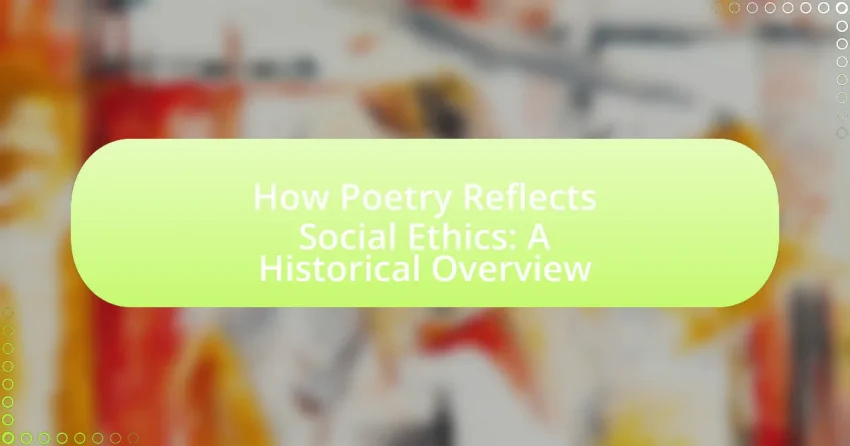The article examines the historical relationship between poetry and social ethics, highlighting how poetry has served as a medium for expressing societal values, moral dilemmas, and cultural critiques across various historical periods. Key periods discussed include the Romantic era, Victorian era, and Modernist movement, each contributing to the discourse on social ethics through their poetic expressions. The article also explores how contemporary poetry addresses modern social issues, emphasizing themes such as justice, identity, and inequality, while showcasing the role of poets in advocating for social change. Additionally, it highlights the impact of spoken word and social media on the dissemination of ethical poetry, as well as the importance of personal experience in shaping ethical themes.

How has poetry historically reflected social ethics?
Poetry has historically reflected social ethics by serving as a medium for expressing societal values, moral dilemmas, and cultural critiques. For instance, during the Romantic period, poets like William Wordsworth and Samuel Taylor Coleridge emphasized individual experience and the importance of nature, which aligned with the ethical shift towards valuing personal freedom and emotional authenticity. Additionally, the works of Langston Hughes and other Harlem Renaissance poets highlighted racial injustice and the quest for equality, directly addressing social ethics related to race and identity. These examples illustrate how poetry not only mirrors the ethical standards of its time but also influences public discourse on moral issues, making it a powerful tool for social change.
What are the key historical periods in poetry that showcase social ethics?
The key historical periods in poetry that showcase social ethics include the Romantic period, the Victorian era, and the Modernist movement. The Romantic period (late 18th to mid-19th century) emphasized individualism and social justice, with poets like William Wordsworth and Percy Bysshe Shelley advocating for the rights of the oppressed. The Victorian era (1837-1901) saw poets such as Alfred Lord Tennyson and Elizabeth Barrett Browning addressing social issues like poverty and gender inequality, reflecting the ethical concerns of their time. The Modernist movement (early 20th century) introduced poets like T.S. Eliot and Langston Hughes, who explored themes of alienation and identity, critiquing societal norms and injustices. Each of these periods contributed significantly to the discourse on social ethics through their poetic expressions.
How did the Romantic era influence the perception of social ethics in poetry?
The Romantic era significantly influenced the perception of social ethics in poetry by emphasizing individualism, emotion, and the critique of societal norms. Poets like William Wordsworth and Samuel Taylor Coleridge focused on the importance of personal experience and moral integrity, advocating for a connection between nature and humanity that challenged the industrialized society of their time. This shift led to a greater awareness of social issues, such as poverty and injustice, as seen in the works of poets like Percy Bysshe Shelley, who called for social reform and championed the rights of the oppressed. The Romantic movement’s focus on the subjective experience and moral responsibility reshaped poetry into a medium for social critique and ethical reflection, highlighting the interconnectedness of personal and societal values.
What role did the Modernist movement play in addressing social issues through poetry?
The Modernist movement played a crucial role in addressing social issues through poetry by challenging traditional forms and exploring themes of alienation, identity, and societal disillusionment. Modernist poets, such as T.S. Eliot and Ezra Pound, utilized innovative techniques like stream of consciousness and fragmented narratives to reflect the complexities of modern life, particularly in the wake of World War I and the rapid industrialization of society. Their works often critiqued the moral and social fabric of their time, highlighting issues such as class disparity, gender roles, and the loss of individual agency. For instance, Eliot’s “The Waste Land” serves as a poignant commentary on the disintegration of cultural values and the existential crises faced by individuals in a fractured world. This focus on social critique and the human condition established poetry as a powerful medium for reflecting and addressing pressing social issues.
Why is the relationship between poetry and social ethics significant?
The relationship between poetry and social ethics is significant because poetry serves as a powerful medium for expressing and challenging societal values and moral dilemmas. Throughout history, poets have used their work to reflect on social injustices, advocate for change, and inspire collective action, as seen in the works of poets like Langston Hughes and Maya Angelou, who addressed racial inequality and civil rights. This connection highlights how poetry not only mirrors societal norms but also influences ethical discourse, making it a vital tool for social critique and transformation.
How does poetry serve as a mirror to societal values and norms?
Poetry serves as a mirror to societal values and norms by encapsulating the beliefs, emotions, and experiences of a culture at a specific time. Through its themes, language, and structure, poetry reflects the prevailing attitudes towards issues such as love, justice, identity, and morality. For instance, the works of poets like Langston Hughes during the Harlem Renaissance highlighted racial injustices and aspirations for equality, thereby revealing the societal struggles and values of that era. Similarly, the Romantic poets emphasized individualism and nature, reflecting the shift in societal values towards personal expression and emotional depth in the late 18th and early 19th centuries. These examples demonstrate how poetry not only captures but also critiques and influences societal norms, making it a vital tool for understanding cultural dynamics.
In what ways can poetry challenge or reinforce social ethics?
Poetry can challenge social ethics by critiquing societal norms and injustices, while it can reinforce social ethics by promoting shared values and moral lessons. For instance, poets like Langston Hughes used their work to confront racial inequality and advocate for civil rights, thereby challenging the prevailing social ethics of their time. Conversely, works such as Robert Frost’s “The Road Not Taken” emphasize individual choice and moral reflection, reinforcing the ethical value of personal responsibility. Historical examples demonstrate that poetry serves as both a mirror and a catalyst for ethical discourse, influencing public perception and societal change.

What themes in poetry illustrate social ethics across different cultures?
Themes in poetry that illustrate social ethics across different cultures include justice, equality, oppression, and human rights. These themes resonate universally, as poets often address societal issues that reflect the moral values and ethical dilemmas faced by their communities. For instance, the theme of justice is prevalent in works like Langston Hughes’ “Let America Be America Again,” which critiques racial inequality in the United States, while the theme of oppression is vividly depicted in Pablo Neruda’s poetry, which highlights the struggles against dictatorship in Chile. Additionally, the theme of human rights is central to the works of poets like Maya Angelou, whose poem “Still I Rise” embodies resilience against systemic injustice. These examples demonstrate how poetry serves as a powerful medium for expressing and advocating social ethics across diverse cultural landscapes.
How do various cultures express social ethics through poetry?
Various cultures express social ethics through poetry by using verse to convey moral values, societal norms, and collective experiences. For instance, in ancient Greece, poets like Homer illustrated concepts of honor and justice, reflecting the ethical frameworks of their society. Similarly, in Indian literature, works such as the “Bhagavad Gita” employ poetic dialogue to explore duty and righteousness, emphasizing the importance of ethical conduct in personal and social contexts. In contemporary times, spoken word poetry in the United States addresses issues like racial inequality and social justice, showcasing the power of poetry as a medium for ethical discourse. These examples demonstrate how poetry serves as a vehicle for articulating and challenging social ethics across different cultures and historical periods.
What are some examples of ethical themes in African poetry?
Examples of ethical themes in African poetry include social justice, human rights, and the critique of colonialism. Poets like Chinua Achebe address the moral implications of cultural identity and the impact of colonial rule on African societies. Additionally, poets such as Niyi Osundare explore environmental ethics and the relationship between humanity and nature, emphasizing the need for sustainable practices. The works of these poets reflect a commitment to ethical considerations that resonate with the struggles and aspirations of African communities, showcasing the role of poetry as a vehicle for social change and moral reflection.
How does Asian poetry address social justice and ethics?
Asian poetry addresses social justice and ethics by using vivid imagery and personal narratives to highlight societal issues and advocate for change. For instance, poets like Faiz Ahmed Faiz from Pakistan and Agha Shahid Ali have employed their works to critique political oppression and promote human rights, reflecting the struggles of marginalized communities. Additionally, contemporary Asian poets often explore themes of identity, gender inequality, and environmental justice, as seen in the works of poets like Ocean Vuong and Tishani Doshi, who articulate the complexities of their cultural experiences while calling for ethical responsibility and social reform. This engagement with social justice is evident in the historical context of poetry as a tool for resistance and reflection, making it a vital medium for ethical discourse in Asian societies.
What common ethical dilemmas are explored in poetry worldwide?
Common ethical dilemmas explored in poetry worldwide include themes of justice, identity, love versus duty, and the conflict between individual desires and societal expectations. Poetry often reflects the struggle for justice, as seen in works addressing oppression and inequality, such as Langston Hughes’ “Let America Be America Again,” which critiques social injustice. Identity is another prevalent theme, with poets like Maya Angelou exploring personal and cultural identity in the context of societal norms. The tension between love and duty is illustrated in classic works like Shakespeare’s “Romeo and Juliet,” where familial obligations clash with romantic desires. Additionally, poets frequently examine the conflict between individual aspirations and societal pressures, as demonstrated in the works of Sylvia Plath, who delves into personal struggles against societal expectations. These themes resonate across cultures, highlighting the universal nature of ethical dilemmas in human experience.
How do poets address issues of inequality and injustice?
Poets address issues of inequality and injustice by using their work to highlight social disparities and advocate for change. Through vivid imagery, personal narratives, and powerful language, poets can evoke emotional responses that raise awareness about systemic issues such as racism, poverty, and gender inequality. For example, Langston Hughes in his poem “Let America Be America Again” critiques the American Dream by exposing the unfulfilled promises for marginalized communities, illustrating the gap between ideals and reality. Similarly, Maya Angelou’s “Still I Rise” serves as a declaration of resilience against oppression, empowering those who face discrimination. These examples demonstrate how poetry serves as a vehicle for social commentary, encouraging readers to reflect on and challenge societal injustices.
What role does personal experience play in the ethical themes of poetry?
Personal experience significantly shapes the ethical themes of poetry by providing authentic insights into moral dilemmas and societal issues. Poets often draw from their own lives to explore complex ethical questions, allowing readers to connect emotionally and intellectually with the themes presented. For instance, the works of poets like Maya Angelou and Langston Hughes reflect their personal experiences with racism and injustice, which in turn illuminate broader social ethics. This connection between personal narrative and ethical exploration enhances the relatability and impact of the poetry, making it a powerful medium for discussing moral values and societal norms.

How can contemporary poetry influence modern social ethics?
Contemporary poetry can influence modern social ethics by providing a platform for marginalized voices and challenging societal norms. Through the exploration of themes such as identity, injustice, and inequality, contemporary poets like Claudia Rankine and Ocean Vuong address pressing social issues, prompting readers to reflect on their own beliefs and behaviors. For instance, Rankine’s “Citizen: An American Lyric” confronts racial microaggressions, fostering awareness and dialogue about race relations in America. This engagement with social issues encourages empathy and can lead to shifts in ethical perspectives, as poetry often evokes emotional responses that inspire action and change.
What are the current trends in poetry that reflect social ethics today?
Current trends in poetry that reflect social ethics today include a focus on intersectionality, climate justice, and mental health awareness. Poets increasingly explore the interconnectedness of social identities, emphasizing how race, gender, and class influence individual experiences and societal structures. For instance, the rise of spoken word and slam poetry has provided a platform for marginalized voices, allowing for the expression of personal and collective struggles related to systemic oppression. Additionally, poetry addressing climate change highlights the ethical responsibility to advocate for environmental justice, as seen in works by poets like Amanda Gorman, who intertwine ecological themes with social activism. Furthermore, the growing emphasis on mental health in poetry reflects a societal shift towards destigmatization, with poets using their art to discuss personal experiences and advocate for broader awareness and support. These trends demonstrate how contemporary poetry serves as a vehicle for social critique and ethical reflection, engaging audiences in critical conversations about pressing societal issues.
How do spoken word and slam poetry address contemporary social issues?
Spoken word and slam poetry address contemporary social issues by providing a platform for marginalized voices to express their experiences and advocate for change. These forms of poetry often tackle themes such as racial inequality, gender identity, mental health, and social justice, reflecting the realities faced by individuals in society. For instance, the National Poetry Slam, which began in 1990, has showcased performances that highlight systemic injustices, allowing poets to engage audiences emotionally and intellectually. This engagement fosters awareness and encourages dialogue around pressing social issues, making spoken word and slam poetry powerful tools for activism and community building.
What impact does social media have on the dissemination of ethical poetry?
Social media significantly enhances the dissemination of ethical poetry by providing a platform for immediate sharing and engagement. This accessibility allows poets to reach diverse audiences quickly, fostering discussions around ethical themes. For instance, platforms like Instagram and Twitter enable poets to share their work widely, often leading to viral trends that amplify messages of social justice and ethics. Research indicates that social media can increase audience engagement by up to 50%, demonstrating its effectiveness in spreading ethical poetry.
How can readers engage with poetry to understand social ethics better?
Readers can engage with poetry to understand social ethics better by analyzing the themes, language, and historical context within the poems. This engagement allows readers to explore moral dilemmas, societal norms, and the human experience as expressed by poets throughout history. For instance, works like Langston Hughes’ “Let America Be America Again” highlight issues of racial inequality and social justice, prompting readers to reflect on ethical implications in society. Additionally, poetry often employs metaphor and imagery to evoke emotional responses, facilitating deeper connections to ethical questions. By participating in discussions, attending readings, and writing personal reflections on poetry, readers can further enhance their understanding of social ethics as they relate to contemporary issues.
What are some recommended contemporary poets who focus on social ethics?
Contemporary poets who focus on social ethics include Claudia Rankine, who addresses issues of race and identity in her work, particularly in “Citizen: An American Lyric,” which explores the impact of systemic racism. Another notable poet is Ocean Vuong, whose collection “Night Sky with Exit Wounds” delves into themes of immigration, family, and trauma, reflecting on the ethical implications of personal and collective histories. Additionally, Tracy K. Smith, the former U.S. Poet Laureate, engages with themes of history and social justice in her poetry, particularly in “Wade in the Water,” which examines the legacy of slavery and its ongoing effects on society. These poets exemplify how contemporary poetry can serve as a powerful medium for exploring and critiquing social ethics.
How can poetry workshops foster discussions on ethics and social justice?
Poetry workshops can foster discussions on ethics and social justice by creating a collaborative space where participants explore and express their thoughts on societal issues through poetry. These workshops encourage individuals to share personal narratives and perspectives, which can highlight injustices and ethical dilemmas within their communities. For instance, studies have shown that engaging in creative writing can enhance empathy and critical thinking, allowing participants to better understand diverse viewpoints and the complexities of social justice. By analyzing and discussing poems that address themes of inequality, oppression, and resistance, participants can deepen their awareness of ethical considerations and inspire collective action for social change.
